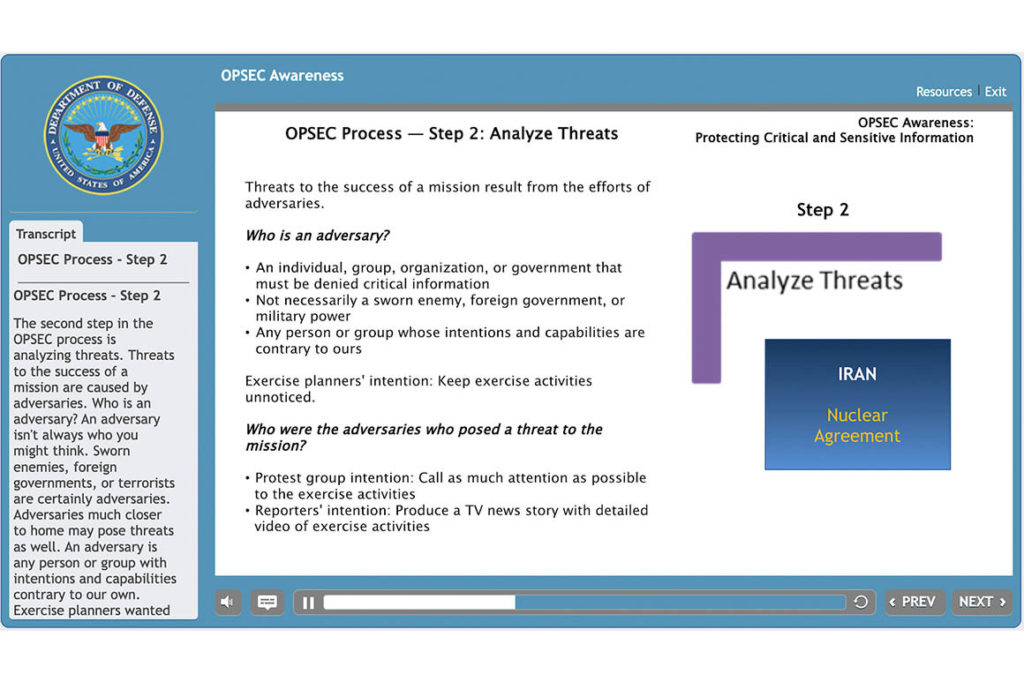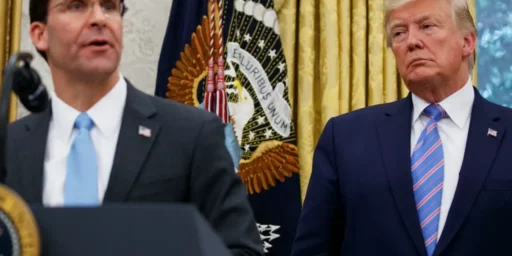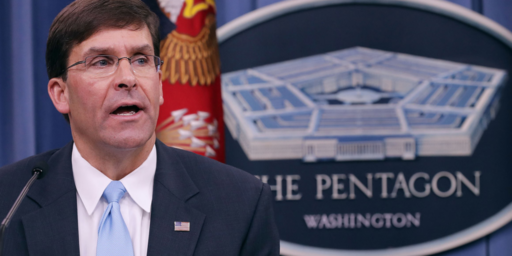Pentagon Training IDs Press as ‘Adversaries’
The reporting demonstrates the uncomfortable truth.

POLITICO is trending with a story headlined “New Pentagon training refers to protesters, journalists as ‘adversaries’.” It’s much ado about very little.
A new mandatory Pentagon training course aimed at preventing leaks refers to protesters and journalists as “adversaries” in a fictional scenario designed to teach Defense Department personnel how to better protect sensitive information.
The new course was recently launched as part of Defense Secretary Mark Esper’s effort to improve “operational security,” or OPSEC, and clamp down on leaks. The training materials are public and include a video message from Esper, as well as a July 20 memo outlining his concerns about operational security and directing all DoD personnel — military, civilian and on-site contractors — to take the course within the next 60 days.
Because we’re still on minimum manning and I had a ton of work to get done before our annual summer faculty development session kicks off today, I haven’t yet completed said training but was dreading it.
“Unfortunately, poor OPSEC practices within DoD in the past have resulted in the unauthorized disclosure or ‘leaks,'” Esper writes in the memo. “The Department of Defense (DoD) remains committed to transparency to promote accountability and public trust. [However] unauthorized disclosures jeopardize our DoD personnel, operations, strategies and policies to the benefit of our adversaries.”
While I’m dubious that we need yet more mandatory, poorly-crafted training to solve this problem, it’s unassailable that there are constant leaks, some of which endanger the mission and help our adversaries.
The training comes amid worsening relations between the federal government and protesters. President Donald Trump in June threatened to deploy active-duty troops in U.S. cities to tamp down protests against police brutality, and more recently, federal agents wearing military-style uniforms have cracked down on vandalism and demonstrations in Portland, Ore. And while Trump has repeatedly labeled news outlets as “the enemy of the people,” the Defense Department has been careful to avoid doing the same.
Correct. At least at my—admittedly somewhat sheltered—level, I have seen zero difference during this administration from the attitudes during the Obama administration. We teach our students to be wary of reporters tricking them into divulging sensitive information or framing things in a way detrimental to the mission. But we simultaneously try to convey the importance of communicating with the American people. It’s a delicate balancing act.
Lt. Col. Uriah Orland, a Pentagon spokesperson, defended the use of the term “adversaries” in the training.
“An adversary — a common generic term for a person or group that opposes one’s tactical goals — is acting counter to our information security objectives and therefore personnel must understand that threat,” Orland said in a statement. “Attempting to read more into the use of the term obfuscates the clear purpose of the training: to prevent information from falling into unauthorized hands regardless of its potential use.”
So, Orland is probably wrong here. It’s milspeak, not how normal people talk. Still, had I seen the training absent POLITICO’s framing, I wouldn’t have blanched. (More on that shortly.)
George Little, who was a Pentagon press secretary and CIA spokesperson in the Obama administration, called the characterization “appalling and dangerous.”
“It brings to mind the same tin ear Secretary Esper recently demonstrated when he used the military term battlespace to describe America’s city streets,” Little said. “The Pentagon and the press have a long history over working alongside each other in service of the American people. Even when they don’t see eye to eye on the issues, there’s been a long history of respect for their common mission, and it’s unfortunate that the current Pentagon leadership has largely abandoned it.”
That’s histrionic. Esper has from time to time embarrassed himself by echoing the President’s nonsense. But the Obama administration was practically obsessed with leaks and going after leakers.
In one section of the course, trainees are given a fictional scenario in which news of a secret military exercise gets out, and TV cameras and hundreds of “anti-government protesters” show up. The exercise and the protest end up as the lead story on the evening news.
In such a scenario, the course instructs trainees to identify the “adversaries,” who it says are driven to exploit “vulnerabilities” for their own gain. In the particular scenario in the course material, the exercise organizers aimed to keep the event unnoticed, a goal that was contrary to the aims of reporters and protesters, Orland explained.
“The protest group was an adversary, not because of its political beliefs, but because its intentions were contrary to the success of the training mission,” the narrator says. “Reporters also had contrary intentions and capabilities. They wanted to capture exercise activities and on video and report them on the evening news. In this instance, the reporters are adversaries.”
In the scenario, the protest group “clearly exploited one or more vulnerabilities,” the narrator states.
This is simplistic and unhelpful. But pretty much all DoD training modules are simplistic and unhelpful. Further, the training is repetitious and mundane. We all hate it, seeing it as box-checking rather than serious professional development.
But here’s the slide in question:

The verbiage couldn’t be more clear: “Sworn enemies, foreign governments, or terrorists are certainly adversaries. Adversaries much closer to home may pose threats as well. An adversary is any person or group with intentions or capabilities contrary to our own.”
Now, this is problematic in all manner of ways. All foreign governments aren’t certainly adversaries. I hope our NATO Allies and, especially our Five Eyes partners (UK, Canada, Australia, and New Zealand) aren’t considered adversaries—although, even in those cases, there is information classified NOFORN that we are forbidden from sharing. And I have no idea what the hell “capabilities contrary to our own means.”
In the context of this training, it’s perfectly innocuous to consider protestors and the press as “adversaries.” They have contrary goals that endanger the stated objective of keeping the mission secret.
Again, the training is terribly written. I’d have advised some other word than adversaries. Obstacles, maybe.
But this isn’t some sinister plot to condition soldiers to shoot journalists on sight. Rather, it’s a poorly-conceived module reinforcing the idea of safeguarding information that can harm the operation’s goals.





I’m generally sympathetic to your points here, and generally in favor of the military. That said, this slide does not come in a vacuum. The US military has a long, long history of lying to the media and the American people whenever they may get bad press. And these lies are obvious and in your face and create a hostile relationship with the media whose job it is to get the truth.
Young military spokesmen trot out blatant lies with such regularity it is obvious this dishonesty is US policy, endorsed at the highest levels. Given this, it is no leap to believe they are trained to view the press as adversaries.
@MarkedMan:
I don’t think this is remotely true.
At least at my level, we train them to tell the truth but avoid divulging information we don’t want out (in the context of ongoing ops, not investigations and such). They’re trained to stay on message but that’s a different thing than lying.
This training is consistent with the administration attitude that those not part of Cult45 are the enemy. Watch your back James.
As someone who has consumed many mandatory trainings, let me just say that the vast majority of service folks who are subject to the training will not even spend time on the words. If it is not directly relevant to their daily jobs at hand, then the training is marginally relevant. The one slide presented is too busy, too wordy. I would glance at it and move on. If there is a quiz at the end to wrap up the training, I doubt that I would need to have specific knowledge to “pass” it.
Really: “Loose Lips, Sink Ships” is all you need to know.
I’ve always been beyond confused that Hollywood can keep secrets about celebrities’ crazy, and often illegal, behavior from becoming public knowledge. Yet the Pentagon, nor administrations, can’t keep secrets about really important operations. That’s not co actually compare the two, because the secrets Hollywood keeps are of a personal nature and do not ever affect national security yet it’s curious from a sociological and psychological standpoint.
I actually don’t have an issue with the word “adversaries” in the full context. But the problem is that Americans don’t do nuance nor context. So this is going to gobble up a news cycle or two, then dissapear – except on the far far left, where it will resonate lile “Benghazi” does to the right.
@EddieInCA:
Perhaps it is because, what passes for reporting in Hollywood is often tactically placed PR. The reporter, when pressed not to report on something, risks being voted off the island and actually needing to work for a living. While in Washington, conflicting agendas are often parsed by the press.
@Scott: Yup. Most of the time, I turn off the audio, let the video proceed to the point where I have to interact, and then do what I need to in order to get through it. It’s a colossal waste of time, especially once you’ve had the “training” more than once.
@EddieInCA: The military is an enormously large enterprise with a really broad range of talent. Every idiot private now has a smartphone to record himself being an idiot and able to post it to social media for the lulz.
And, yes, as @Sleeping Dog notes, leaks are a way to get another bite at the apple when you’ve lost the policy debate.
No, we don’t. At least, not any more.
I suspect that training about protecting genuinely sensitive information hasn’t changed much, if at all, over the past couple of decades. But at the same time, I have seen a striking trend toward greater and greater obfuscation of information that is not sensitive, though it might be embarrassing. New categories of “sensitive but unclassified” get created; “For Official Use Only” gets abused at record levels; information that used to be available to anyone with a CAC is now only available to those with a CAC hosted at a .mil site (which makes the name “common access card” a bit of a sad joke).
Protecting genuine secrets is important. Protecting DoD from scrutiny is also important, in the opposite direction.
@James Joyner:
I wish I could agree. I could point to the dozens of heavily investigated stories showing misbehavior or mistakes made by the troops in Iraq or Afghanistan where the military trots out some earnest young officer to tell everyone that black is white and up is down. But you could excuse that by saying we are at war, and lies are necessary in war. So instead I’ll point to a relative’s experience in Richland, WA where nuclear R&D was done for the Defense Department since the 1950s and safety protocols and storage procedures were woefully inadequate. For the past thirty years there has been a cycle of Defense spokesmen standing in front of the locals, spit polished and sincere, projecting a competent and understanding demeanor, and assuring them that this particular scandal was the last and from now on they were going to share information and speak openly and honestly. This lasts for a few years, then they declare that everything has been cleaned up and is under control. The local military brass gets promotions and move on… and then a new scandal emerges, one they had to have known about for years. The earnest young press officer gets replaced by a new one who assures everyone that whatever happened in the past, things are different now… and so on. It seems to be a 7 or 8 year cycle.
@Scott:
Agreed. “Adversary” is a really, REALLY poor word choice and they deserve the flak they’re getting for it. There’s a difference between stopping leaks and denying information, between protecting mission security from dumbasses who can’t keep their mouth shut and treating whistle-blowers like the Enemy. “Need-to-know” sums it up – you either need to know this info or you don’t. I shouldn’t give it to you not because you are bad or dangerous in any way but simply because it’s easier to control sensitive information in smaller groups.
“Adversary” has a huge connotation to it of dangerous or malicious opposition even if that’s not it’s actual definition. They could have said “Unnecessary Parties” or “Non-allowed Contacts” or something else to get the point across – do not speak of critical matters to these folks. It’s the same concept as HIPAA: don’t talk about X with Y unless you know you are allowed. HIPAA doesn’t use “Adversary” so there’s clearly better governmental terms out there to choose from….. unless you are trying to subtly convey the fascist, quasi-religious undertone of Enemy.
@MarkedMan:
Your hearsay from your relative about the Hanford site and Pacific Northwest National Labs is so far off the mark as to responsibilities that I’m not sure where to begin. There is a major cleanup mess and has been for 50+ years. But military? Not in sight. The Department of Energy since the 1970s, and before that the Atomic Energy Commission since soon after WWII. Not under DoD since the Manhatten Project (and back then most operations were handled by Dupont Chemicals).
While some nuclear R&D was done there, more has been done at the other National Labs; Hanford’s primary purpose was Plutonium production (ended in 1987).
Not DoD. Zero “local military brass gets promotions and move on” since well before any cleanup started, and I’ve never heard that cleanup was complete (some areas are).
I’m actually sitting about 15 miles away. More info https://www.hanford.gov/page.cfm/HanfordHistory
Trump is a beneficiary of the GOP expertise at playing the long game. The Republican war on the free press, or even the idea of a free press, dates back at least to 1964. It’s never gone into eclipse as a cornerstone (sometimes concealed) of the party’s ideology. Why are we surprised at these latter-day developments?
@Richard Gardner: Sure, the 40 year long contract to produce material for nuclear weapons was held by the DOE and various outside contractors. You may feel that means it wasn’t a military site but I don’t.
My introduction to this was the first time I visited. There had been a battle between some local scientists who claimed that there was exposed radioactive material somewhere in a particular secure area, with the officials denying it. The scientists couldn’t get on the property so they demonstrated that mosquitos coming from a particular section were radioactive, indicating standing water contamination. The officials then changed their story and “found” the leaking drums. My relatives explained that this goes on all the time.
They’ve just reversed course.
The new phrase will be “unauthorized recipients.”
https://www.rawstory.com/2020/07/pentagon-edits-training-materials-to-remove-references-to-protesters-and-journalists-as-adversaries-report/
@EddieInCA:
“Adversary” was a stupid choice. Whoever approved that needs a reprimand.
Unforced error.
Fellow citizens doing their jobs are not adversaries. That slide was an absolute mess in presenting information.
@EddieInCA:
I actually like that. It’s not a euphemism; it’s a blunt statement that “if they asked for this under FOIA, they’d be denied”.